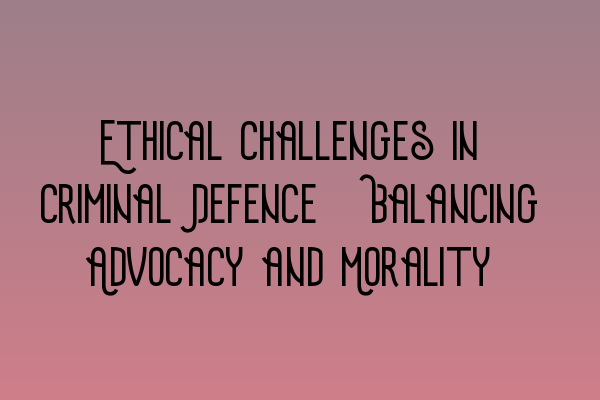Ethical Challenges in Criminal Defence: Balancing Advocacy and Morality
When it comes to criminal defence, lawyers are often faced with ethical challenges that require them to balance their duty as an advocate for their clients and the moral obligations they hold as members of the legal profession. This delicate balance can be difficult to navigate, but it is essential for lawyers to uphold professional standards and ensure justice is served. In this blog post, we will explore some of the ethical challenges that arise in criminal defence and examine how lawyers can effectively address them.
The Duty of Zealous Advocacy
One of the fundamental principles of criminal defence is the duty of zealous advocacy. Lawyers have a responsibility to vigorously represent their clients and advocate for their best interests. However, this duty can sometimes clash with the lawyer’s personal moral beliefs or societal expectations.
For instance, a lawyer may find themselves defending a client who is accused of a heinous crime. Despite personal convictions, it is the lawyer’s duty to provide the best possible defence and ensure the client’s rights are protected. This raises ethical questions about whether lawyers should refuse to defend certain clients based on the nature of the crime.
It is important to remember that every person, regardless of their alleged actions, has the right to a fair trial and legal representation. By upholding the principle of zealous advocacy, even in challenging cases, lawyers contribute to the functioning of a just legal system.
Maintaining Client Confidentiality
Another ethical challenge that lawyers face in criminal defence is maintaining client confidentiality. Lawyers are duty-bound to keep client information confidential, even if they become aware of their client’s guilt or involvement in criminal activities.
This raises the question of where lawyers draw the line between their duty to their client and their responsibility to society. While lawyers have an obligation to respect client confidentiality, they also have a duty to prevent harm and uphold the law. Striking the right balance is crucial.
Lawyers can navigate this ethical challenge by ensuring they do not participate in any criminal activities themselves and by utilizing legal mechanisms, such as plea bargains or informing clients of potential legal consequences, to encourage ethical behavior.
Ensuring Truthful Advocacy
An additional ethical challenge in criminal defence is the duty to ensure truthful advocacy. Lawyers have a responsibility to present the facts of the case accurately and honestly, while also raising any reasonable doubts about the prosecution’s evidence.
However, lawyers must avoid knowingly presenting false evidence or misleading the court. This ethical dilemma arises when lawyers have information that could potentially exonerate their client but conflicts with their duty to the court and the legal profession.
Balancing truthful advocacy and the duty to the court requires lawyers to carefully evaluate the evidence they have and act in accordance with their professional obligations. They must uphold the truth while also fulfilling their duty to their client.
Conclusion
As criminal defence lawyers, it is crucial to navigate the ethical challenges that arise in the practice of law. By understanding the duty of zealous advocacy, maintaining client confidentiality, and ensuring truthful advocacy, lawyers can strike a balance between their role as advocates and their moral obligations.
For more information on related topics, please visit the following articles:
- Demystifying the Solicitors Qualifying Examination Format
- LLC Formation Made Simple: Step-by-Step Guide for UK Entrepreneurs
- LLC Formation: A Step-by-Step Guide for UK Entrepreneurs
- Business Regulations in the UK: A Comprehensive Overview
- Ethical Considerations in UK Law: Upholding Professional Standards
